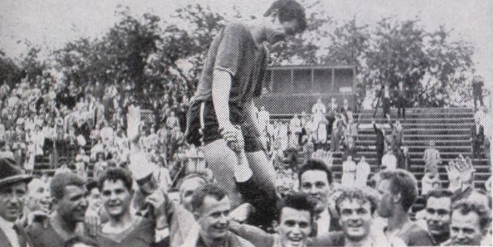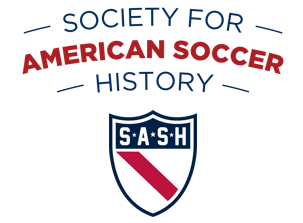
In 2011, I wrote an essay, as part of my series on American soccer history for the Big Soccer website, about the 1960 U.S. Open Cup final, which was one of the greatest of Open Cup finals ever, possibly the greatest. Now along comes the 2022 MLS final, which many people are saying was one of the greatest MLS games ever, possibly the greatest.
The parallels between these two games are quite striking, going far beyond the status as all-time classics that both games enjoy.
As we all know by now, the 2022 MLS final, played on Nov. 5, was between Los Angeles FC and the Philadelphia Union, the two best teams in MLS in 2022, with LAFC winning on penalties after a 3-3 tie. The 1960 game was between the Philadelphia Ukrainian Nationals and the Los Angeles Kickers, the two best teams in American soccer in their era (between them, they were to win the Open Cup six times), with the Philadelphia team winning, 5-3, in double overtime, after the game had been tied, 3-3, both at the end of regulation and the end of the first 30-minute overtime.
Both games featured major stars. The 1960 game had two of the leading lights of the U.S. national team, Al Zerhusen of the L.A. Kickers and Alex Ely of the Philadelphia Uke Nats. At the 2022 game, LAFC had international stars Gareth Bale of Wales and Carlos Vela of Mexico, and Philadelphia had four members of the MLS Best XI, named a few days before. Both games produced heroic performances by lesser stars, with LAFC goalkeeper John McCarthy saving two penalties in the 2022 shootout and Philadelphia Uke Nats forward Mike Noha scoring all five of his team’s goals in the 1960 game.
Both games were very significant occasions with a major title on the line, not just mid-season contests. In 1960, the U.S. Open Cup final was the biggest event in American soccer, far bigger than it is today, with a significance not unlike that which the MLS final holds today. Back then, the winner of the Open Cup was able to consider itself the champion of American soccer, just like the winner of MLS can today. And the fact that finals tend to be tight, low-scoring affairs makes the 14 goals scored in these two games even more eye-popping.
And perhaps most important of all, both games had huge amounts of drama, with the momentum of the game changing hands repeatedly. We all know what happened in the 2022 game. The Philadelphia team came back to tie the game after falling behind by 1-0 and 2-1, and the Los Angeles team came back to tie the game after falling behind by 3-2. Here is how I described the back-and-forth nature of the 1960 game in that Big Soccer essay:
“Zerhusen started the scoring 15 minutes into the game, putting the Los Angeles team in front with a header. Mike Noha, who played inside right for the Ukrainian Nationals and had emigrated from Argentina the year before, evened the score five minutes later, dribbling past four defenders and scoring from eight yards out. Before halftime, Werner Staacke had made it 2-1 for the Kickers when he scored on a penalty and Noha had equalized again, taking advantage after Los Angeles goalkeeper Victor Ottoboni fumbled the ball.
“Fifteen minutes into the second half, a shot from outside the penalty area by Eberhardt Herz gave Los Angeles a 3-2 lead, but a handball in the area led to a penalty by Noha that tied the score once again. In the final minute of regulation time, a Philadelphia goal was called back for offside.
“After 40 minutes of overtime, the first overtime period plus 10 minutes of the second, Noha finally put the Philadelphia team in front for the first time, converting a pass from Ely. Six minutes later, he got the insurance goal.”
A repetition of a pattern established in the 1960s would mean that we haven’t seen the last in this decade of Philadelphia and Los Angeles squaring off in a final. Afterall, the L.A. Kickers and the Philadelphnia Uke Nats met again in the U.S. Open Cup final four years after the 1960 game. They played a 2-2 tie in the 1964 final, through 90 minutes of regulation and 90 minutes of overtime. Los Angeles won the replay, 2-0.
Perhaps these weren’t the greatest U.S. Open Cup final and the greatest MLS game. It’s a very subjective matter and impossible to make an absolute judgement. But they certainly were a pair of games that go down in American soccer history as two epic battles. How often do you see a final in which the losing team scored three goals?
